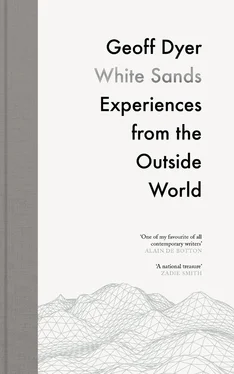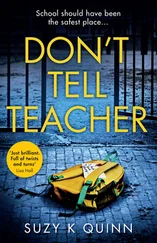The three of us stepped out of the hot shade and into the blazing sun of the courtyard or whatever it should properly be called — Li didn’t elucidate. I watched her flash into the sunlight and we continued our tour of the Forbidden City. We peered inside a couple of dusty-looking rooms, but there was nothing to see except exhausted beds and depressed chairs. Not that it mattered: the interiors were irrelevant compared with the red-and-gold exteriors, all on an unimaginable scale — the full extent of which Li seemed in no hurry to divulge. She seemed so reluctant to begin her spiel that I prompted her with a few questions, the answers to which I would normally have dreaded.
‘I’m afraid I don’t really know anything about the Forbidden City,’ she said.
‘I thought you were a guide.’
‘No, I’m just a friend of Min’s. She asked me to come.’
Mornings like this prove that you really have to be mad ever to kill yourself. Contemplate it by all means, but never commit to it. Life can improve beyond recognition in the space of a moment. On this occasion life had been pretty good anyway and then it had got better still — and got still better when Li said, ‘If you want me to be a guide, I can try.’
‘Yes, go on. Give it a shot.’
‘Well, let me see. There was a time when the emperor’s wives all lived here. They couldn’t leave. All they could do was walk around. It must have been so boring. Except everyone was always plotting. Not necessarily to get rid of the emperor or one of the other wives, partly just to kill the time. It was intriguing all the time.’
‘Your English is fantastic. Intriguing.’
‘Thank you.’
‘Where did you learn?’
‘Here in Beijing. And then in London. I lived in Camden Town. It was. . ’ In spite of her language skills she paused, searching for a less bland variant of very nice . ‘Well, it was rather horrible, if I may say.’ Ah, she’d been worried about offending me.
‘What else? Not about Camden, which is famously vile. This place — the wives, the emperor.’
‘All they wanted, the wives, was for the emperor to love them.’ She said it with such conviction it seemed as if she were not just telling their story; she was petitioning on their behalf.
‘And what did he want?’
‘More wives,’ she said. ‘And to get away from the wives he had.’ Was Li married? I glanced at her long, ringless fingers. Looking at her extremities, her fingers and toes, I felt less exposed than at all points in between.
Always concerned about my welfare, Min had gone to buy bottles of water, which glinted in the sun as she carried them over. We all retreated into the shade and continued our stroll, gulping water. I watched Li drink: her hand, the bottle, the water, her lips. We sat on a low wall, looking at the worn grass and cobbles of the courtyard.
‘To our left,’ said Li, ‘you will admire the Hall of Mental Cultivation.’ We were in the shade, looking at a sign in the sunlight that said ‘Hall of Mental Cultivation.’
‘You’re too modest,’ I said. ‘You actually know a great deal about this place. All sorts of arcane stuff that the foreign tourist could never work out for himself.’ I was very taken with the Hall of Mental Cultivation. It sounded so much more relaxing than sitting in the Bodleian and ordering up dreary books from the stacks, but maybe it was more demanding — and enlightening too. Perhaps, in a way that seemed vaguely Chinese, the Hall of Mental Cultivation was the sign showing the way to the Hall of Mental Cultivation. I was happy with this thought, a sign that I was already cultivating my mental faculties, which were becoming concentrated, almost entirely, on Li. Conscious of this, of how rude it might appear, I tore my gaze from her and chatted with Min until she had to take a call updating the afternoon’s schedule.
The three of us walked in the direction indicated by the sign, came to an empty room that was just an empty room like all the others, though the emptiness it contained must have been qualitatively different to that found in the uncultivated elsewhere.
We could only be out in the sun for five minutes at a time. It was roasting, the sky a burned blue. A month earlier, walking through London at ten on a cloudy evening, I’d been told that this was what Beijing looked like at midday: nearly dark with pollution. I’d had a cough at the time and that was also a foretaste of Beijing, apparently; it was impossible to go there without succumbing to a serious throat or lung infection. I told Li what I’d heard: that the pollution was so bad you could see it falling from the sky.
‘A few years ago we broke the record for air pollution. We didn’t only beat record. The machine for measuring broke also. The pollution was so bad the measure — how you say?’
‘Gauge?’
‘Yes, the gauge could not measure it.’
‘It was off the scale.’
‘It was terrible. . ’
Li took out her phone; she had an air-quality app which confirmed that the air today was, relatively speaking, mountain-clear. Expats I’d met all had these air-quality apps too, but the source for their measurements was the U.S. Embassy, whose figures were always twice that of the official Chinese figures. None of that mattered as we walked through the magically unpolluted but still-roasting air of the Forbidden City, which easily lived up to its billing as one of the wonders of the world. If it was one of the wonders of the world; I could remember only two others, the Hanging Gardens of Babylon and the pyramids. Did the Hanging Gardens even exist anymore? Had they ever — in the solipsistic sense of within my lifetime — or had they only been included as a mythic leftover from the vanished past? These days the whole idea of Seven stately Wonders had an elegiac feel: a standard of excellence rendered obsolete by bucket lists of a hundred things to do before you die, whether bungee-jumping over the Zambezi or losing your mind on mushrooms at a full-moon party at Ko Pha Ngan, neither of which I’d done, both of which were on my list of things to avoid before giving the bucket its final kick.
We paused in the corner of yet another square, heading to the Imperial Garden. Li was drinking water. As she raised the bottle to her lips I could see her armpit, hairless and unsweating. And a small scar at the edge of her mouth. It could only be seen when she was in sunlight, when that side of her face was turned to the sun. Min suggested she take a picture of the two of us, of Li and me together. I put my arm around Li’s shoulder but didn’t dare touch her bare skin. When I looked at it later the photo seemed marred by my hand, bunched in a fist like a potato.
‘You look so handsome,’ said Min, glancing at the image on the back of the camera, taking another. She was always saying things like that. A surprising number of her colleagues from the publishing house said the same thing, in fact, and I was not at all displeased to hear these nice things. It might even have been true in a way. The friend who’d warned me about the pollution had also warned — in the sense of reassured — that Chinese women found white middle-aged men attractive. Was this true or was it a kind of mirror projection of the yellow fever to which Western men succumbed? Either way, the constant flow of charm from Min and her colleagues, combined with how young everyone looked, lulled me into behaving like an attractive young man. I became so at home with this new self-image that, on Nanjing Road in Shanghai, I’d glared with disdain at a middle-aged Westerner coming towards me with an expression of barely concealed contempt. The mirrored window had been polished to such a shine that the awful truth took another second to reveal itself. I had bumped, almost literally, into my own reflection: the self as pink-faced other. Right now, flattered by Min and having my picture taken with Li, that was a faded, possibly false memory. And Min’s capacity to make me feel better about myself and the world knew no bounds. It was too hot for her, she said. She had to make arrangements with the driver; she would meet us outside in half an hour.
Читать дальше












